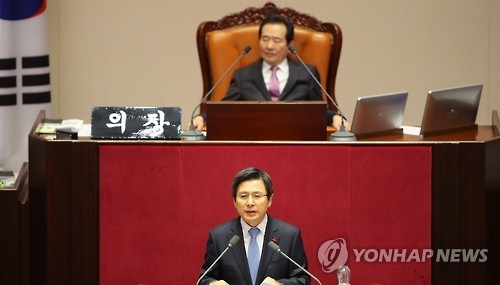South Korea's parliament on Saturday approved a 400.5 trillion won (US$341.4 billion) budget bill for next year after the government and parties resolved their differences over a controversial free child care program a day earlier.
The National Assembly passed the 2017 spending plan in a 221-30 vote, with 30 abstentions, about four hours after the Friday deadline set by the Constitution. The total approved by lawmakers is 200 billion smaller than proposed by the government.

The 2 trillion won child care program for those age 3 to 5 was the key sticking point in the budget negotiations. Political parties demanded the central government fund 1 trillion won for the program, with the remainder backed by provincial education offices.
The government, however, claimed it could only provide up to 700 billion won.
During last-minute talks with the three main parties, the government agreed to pay 860 billion won and establish a three-year special account for that purpose.
They also decided to create a new top-tier rate for income taxes to bankroll child care support. Those earning more than 500 million won per year will be subject to a 40-percent income tax rate. The opposition's demand for an increase in corporate tax was turned down.
It marks the first time in 16 years for South Korea's income tax rate to reach 40 percent. The highest rate bracket, which hovered around 70 percent in the 1970s, continued to decline over the past decades to reach 36 percent in 2002 and then went up to 38 percent in 2012, which currently applies to those earning more than 150 million won per year.
The latest change is expected to enable the government to collect around 600 billion won more annually.
The finance ministry estimates around 46,000 people will be affected by the change.
Opposition parties hailed the tax increase, expressing hope that it will help address income disparities.
Political pundits, however, said the hike in the income tax contradicts with the incumbent administration's initial pledge to not increase taxes while expanding welfare services.
The new budget plan also slashed funding on projects presumed to be linked with President Park Geun-hye's confidante Choi Soon-sil, who has been at the center of the influence-peddling scandal that has rocked the country over the past weeks.
The budget plan, on the other hand, added 50 billion won to generate more jobs in the public sector, amid rising unemployment among youth.
To strengthen South Korea's defense capabilities, the parliament and the government decided to spend 1.6 trillion won on the development of key systems, namely the "Kill Chain" strike system, and the Korean Air and Missile Defense (KAMD) and Korea Massive Punishment & Retaliation (KMPR) programs.
The budget plan moreover increased the amount of funds to be spent on establishing counter-earthquake systems by 140.3 billion won. (Yonhap)






![[From the Scene] Monks, Buddhists hail return of remains of Buddhas](http://res.heraldm.com/phpwas/restmb_idxmake.php?idx=644&simg=/content/image/2024/04/19/20240419050617_0.jpg&u=20240419175937)







![[From the Scene] Monks, Buddhists hail return of remains of Buddhas](http://res.heraldm.com/phpwas/restmb_idxmake.php?idx=652&simg=/content/image/2024/04/19/20240419050617_0.jpg&u=20240419175937)

![[KH Explains] Hyundai's full hybrid edge to pay off amid slow transition to pure EVs](http://res.heraldm.com/phpwas/restmb_idxmake.php?idx=652&simg=/content/image/2024/04/18/20240418050645_0.jpg&u=20240419100350)

![[Today’s K-pop] Illit drops debut single remix](http://res.heraldm.com/phpwas/restmb_idxmake.php?idx=642&simg=/content/image/2024/04/19/20240419050612_0.jpg&u=)